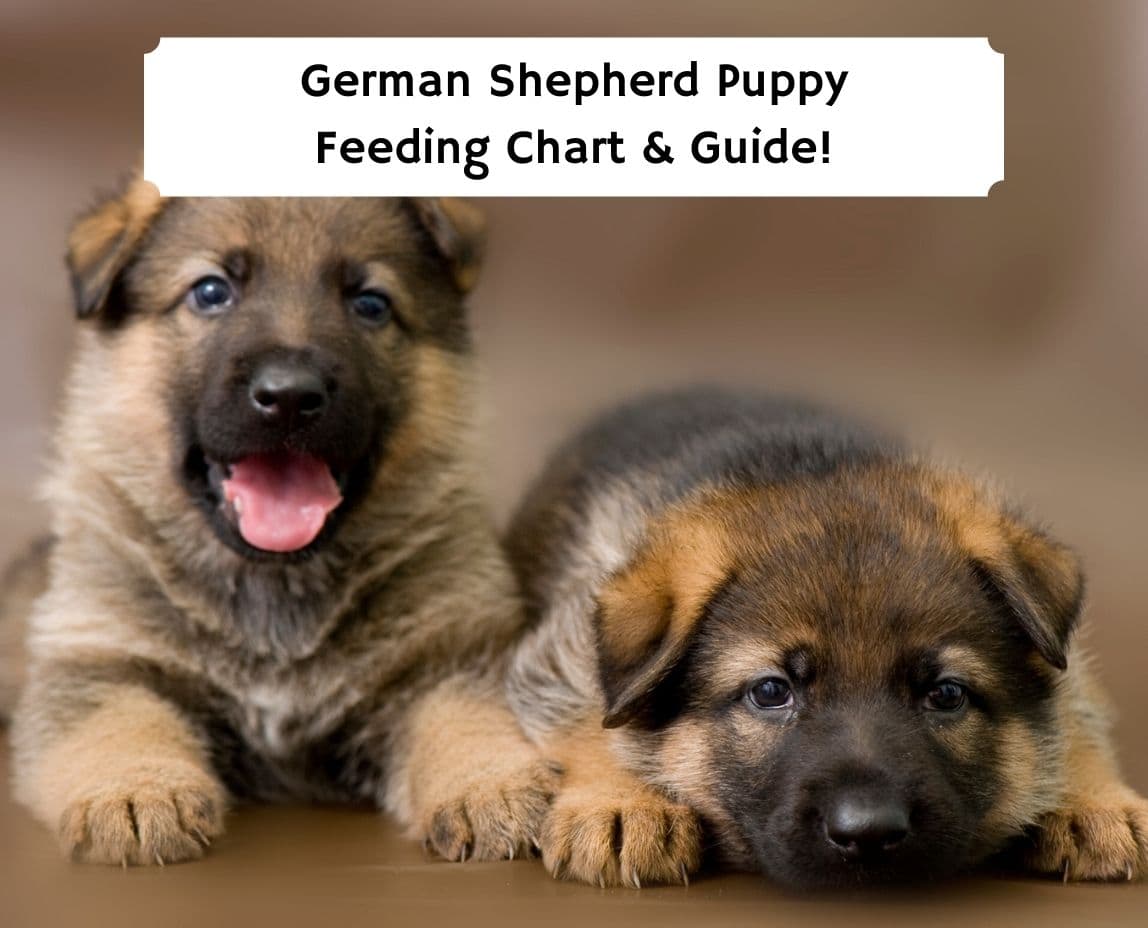How Long Do You Feed a German Shepherd Puppy Food

German Shepherds are some of the most beloved dogs out there. They are smart, strong, and loyal dogs that make amazing guard dogs but also family pets. It comes as no surprise that many people are looking to buy GSD puppies. In fact, they are among the few dog breeds whose popularity never seems to decline.
However, when new dog owners get a new pet, many don't really understand how much food they should feed a German Shepherd puppy. This is why we've created a German Shepherd puppy feeding chart to help new owners understand the feeding requirements of their pets.
No matter the dog breed, all puppies need balanced nutrition and good exercise for their energy levels. If you manage to satisfy those needs, your GSD puppy will grow healthy and strong.
So, no matter if you've got an 8-week old puppy or a young adult German Shepherd that has reached its second year of life, we've got you covered.
Below you can find our German Shepherd puppy feeding chart, as well as some advice on how to properly feed your GSD.
German Shepherd Puppy Feeding Chart

Before we get into more detail, you can see a quick German Shepherd puppy feeding chart down below.
| Puppy Age | Cups of Dry Kibble Daily |
| 2–3 months old | 1–1.5 cups |
| 3–6 months old | 1.5–2 cups |
| 6–12 months old | 2–3 cups |
| 12 months old and older | 2.5–3.5 cups |
Of course, there are several things you need to take into consideration, and we'll talk about that later on. Because of this, take this German Shepherd puppy feeding chart as a guide and not as a set rule.
How Much Do You Feed A German Shepherd Puppy?

When feeding your German Shepherd puppy, you have to be very careful. Puppies of all breeds love to eat, and they can hardly control themselves when around food. In fact, if you leave many dogs with an opened bag of food, chances are they'd eat until they end up feeling sick.
This is because dogs are opportunistic eaters. Their wild ancestors used to eat every blue moon, so when they would manage to catch prey, they'd eat as much as they could because they needed to take in as much energy as possible. Otherwise, they might not have lived very long.
Because of this, puppies are prone to overeating, and they can easily become overweight. An overweight puppy will likely grow into an obese adult dog, which is never a good thing.
While we've given you the German Shepherd puppy feeding chart, this should be a guide to be used for an average dog. You need to look at your puppy's weight, appetite, as well as the type of food you're feeding them.
For example, dogs don't need the same amount of dry kibble as they would if they were to eat wet food.
How Many Calories Are Needed For A German Shepherd Puppy?
One thing our German Shepherd puppy feeding chart didn't cover is the number of calories required for a puppy to have enough energy without becoming obese.
There are several things that you need to take into consideration when determining how many calories your puppy needs. For example, active puppies will need more calories than puppies that spend most of their days sleeping.
A general rule of thumb is that a German Shepherd puppy requires at least 500 kcals daily. However, this amount increases with weight.
The best way to determine how many calories your GSD puppy needs is to calculate its RER (resting energy requirements). The basic formula is 70*(weight in kg)3/4
For example, if your German Shepherd puppy weighs 20 kgs, their RER would be 70*(20)3/4, which is 1,324 calories.
Things To Consider When Feeding Your German Shepherd

Before we go any further, it's time to finally explain what you need to consider when deciding on the right amount of dog food your GSD puppy needs.
The following factors vary from dog to dog, but they are essential in learning how to apply the German Shepherd puppy feeding charts you see everywhere.
Size
The American Kennel Club (AKC) states that German Shepherds can reach a height of 26 inches. While females weigh between 49 and 71 lbs, males can reach up to 88 lbs.
While they are considered a medium to large breed, the truth is that this is a big, strong dog that requires lots of food to satisfy its high energy levels.
Keep in mind that the height of the puppy doesn't mean much. It is the weight you need to look at. Of course, your puppy shouldn't become obese.
The best way to know whether your GSD puppy is at a healthy weight is to feel their ribs. If the ribs are visible and you can touch them clearly, they is underweight, and you should increase the amount of food and calories they eat.
On the other hand, if you cannot feel their ribs at all, your puppy is overweight, and you should lower their caloric intake while increasing the amount of exercise.
A healthy puppy should have some meat over its bones, but not too much. You'll be able to touch its ribs, but they won't be prominent.
Age
Because German Shepherds are strong dogs with lots of energy that can change throughout their lives, it's important to change their nutrition levels depending on their life stage. These are fast-growing dogs, and you'll need to regularly monitor their weight while they are young.
At the same time, their nutritional needs will depend on their energy levels. A puppy will need more energy found in proteins and carbs than old German Shepherds that are much more sedentary and prefer to lie on the couch all day long.
Of course, no matter a dog's age, you'll always want to pick the best dog food for German Shepherds out there. High-quality, healthy food is the only way to ensure your GSD puppy grows into the best dog possible.
Activity Levels

You probably already know that activity levels affect how much humans should eat. A professional athlete should eat more than someone who spends most of their days indoors. This is because high activity levels require a higher caloric need, but they also need high-quality foods.
You cannot expect an athlete to eat fast food and drink soda all the time. They require good calories that their bodies will be able to turn into energy. The same goes for dogs.
If you give your puppy human food that their bodies cannot process, many of these calories will be useless other than to create layers of fat. For German Shepherds, this could be a death sentence. Not to mention the health problems that could occur if you don't feed your dog proper dog food!
Health
All dog breeds are prone to certain health issues. German Shepherds are no different. They are prone to certain conditions such as hip dysplasia, arthritis, and gastric torsion (bloat) that plague many large breed dogs.
A healthy diet and proper nutritional intake are essential to make sure your dog is healthy. It's always a good idea to try to prevent problems before they occur, and this is especially the case with health conditions.
Not just that, but dogs with certain health problems have different nutritional needs than healthy German Shepherd dogs. For example, dogs with gluten intolerance should eat grain-free and gluten-free foods, while dogs with diabetes shouldn't eat foods with sugar.
You need to look at your dog's overall condition before deciding on the type of food they require.
How Much Do You Feed A German Shepherd Puppy?

Now that you've seen the factors you need to consider, you can follow the German Shepherd puppy feeding chart we've given you. Still, we've included a feeding guide, just to make everything clear.
Here's how much you should feed a GSD puppy, according to its age:
2 Week Old GSD Puppy
A puppy that is only two weeks old is too young to be separated from its mother. The only food they should be eating is their mother's milk that they are entirely reliant on.
At this age, puppies will open their eyes for the first time. Still, they won't go anywhere without their mother, and they'll eat whenever they are hungry. Unless you see a runt in the litter, don't interfere. They and their mother know how much food they need to eat.
If you're a breeder and have a large litter, make sure to monitor all the puppies to make sure all are getting their fair share of their mother's milk. If you notice a puppy that's not growing enough, try to get dog formula that can help increase a newborn GSD puppy's weight.
You might also want to contact a local vet if you suspect something is wrong with one of your puppies.
3 Week Old GSD Puppy

Once your GSD puppy reaches three weeks, they'll be a bit more active than before, but they'll still spend most of their time napping at their mother's side.
This still isn't the time to switch to adult dog food or even puppy dog food. Puppies that young need to drink their mother's milk, and they should eat on demand. If a mother dog refuses to nurse her puppies, try giving them formula.
4 Week Old GSD Puppy
When a puppy is four weeks old, they'll start to explore the world around them. While their main nutritional intake should come from their mother's milk, this might be a good time to try to introduce them to puppy food.
Start by giving the litter tiny amounts of puppy food and see if the puppies are interested in trying it. Don't force them to eat other than to bring their heads and muzzles close to the food.
Make sure to keep a ratio of 1/4 puppy food to 3/4 of water. Puppies' digestive systems aren't yet properly developed, so they won't be able to handle large amounts of food other than milk. Also, don't expect them to eat too much.
5 Week Old GSD Puppy

When a puppy reaches five weeks of age, they might be more interested in the puppy food and water mixture you tried giving to them before. Even puppies that weren't even a tiny bit interested in it will likely want to try it now.
Just remember to still mix 1/4 of puppy food with 3/4 of water. Their stomach is still really small, and they should mostly be drinking their mother's milk, so they might not want to eat lots of this food combination.
Don't force them. Their mother will guide them toward weaning it if they don't feel ready to risk it just yet. Puppies can be really scared of trying new things. Not just that, but they might end up with an upset stomach afterward.
6 Week Old GSD Puppy
A puppy that is six weeks old should slowly stop drinking its mother's milk and start eating puppy food as its main nutrient source. The best way to do this is to slowly increase the amount of puppy food in the same amount of water and make a formula with more and more food.
Start when your puppy is ready to eat 1/4 food to 3/4 water regularly. Increase the amount of food to make a 50/50 mixture. If your GSD puppy can eat this without any problems, give them mostly puppy food with a little bit of water in it.
At this point, the puppy should already love to explore, and they'll spend a lot of time away from their mother exploring the world. They'll also be more active, which is why the mother's milk won't provide them with enough energy they need.
7 Week Old GSD Puppy
A 7-week old German Shepherd puppy should be able to eat dry dog food for puppies without any water in it. Not just that, but they won't hesitate to eat it.
This is the time when the puppy's appetite will grow. As such, don't allow them to eat as much food as they'd like anymore. Instead, give them a few kibbles four to five times a day.
Also, a puppy of this age should still sometimes be fed by their mother. By now, she'll feed them while standing instead of lying down.
The mother will likely no longer be as willing to have her puppies feed for as long as they like. Their puppy teeth should be growing by now, and feeding them milk will likely be unpleasant.
8–9 Week Old GSD Puppy

A puppy that reaches two months of age should be switched to the new food completely. They will no longer need their mother's milk, and she will finally have some time to rest.
As this is the age many GSD puppies get adopted into their forever homes; chances are, this is the moment when dog owners take control over their new puppy's feeding time and amount.
This is also the time to establish a strict feeding schedule. Feed your puppies three times a day, and make sure their mealtimes are always at the same time.
As for the amount, feel free to offer your puppy up to 1.5 cups of food, but don't force them to eat it all. Also, don't feed them more, even if they want it.
Of course, it's important to start taking into consideration everything we listed before. While all young puppies are rarely active, the number of calories they spend can still be very different, so always look at your dog's needs.
Also, it is always best to give several smaller meals than one large one, as this can help your puppy's digestive system work properly.
Not just that, but it's also important for your puppy to always have access to freshwater. As they'll be eating dry dog food, they'll need to drink plenty of it.
It's important to mention another important feeding guideline. If you've adopted your puppy at this age, chances are you'll be changing your dog's diet from what they're used to eating at the breeder's.
It's important to make sure this transition is gradual and that you carefully mix their old food with the new one for at least a few days. This will help prevent an upset stomach.
Also, take away any uneaten food instead of allowing it to stay in the bowl. This way, you'll have full control over the amount of food your dog eats, and it'll also make sure your puppy knows they'll eat when you allow them to.
10 Week Old GSD Puppy
At this age, your German Shepherd will start to feel hungry as their activity levels will be through the roof. While it's still important to feed them three times a day, you may add half a cup to a cup of food more than what they were eating, depending on their weight.
This is the time you can expect to see a growth spurt in your puppy, so you'll have to carefully monitor their weight. While having too much weight is dangerous for a dog of any age, it's especially dangerous for a large breed puppy.
If a dog is overweight at this age, its bones might be under too much pressure, which will greatly increase the chances of most health conditions. It's always important to monitor how much your puppy eats and look at their tummy to make sure it isn't bloated.
Also, if you see ribs, it's time to add more food to their mealtimes.
11–12 Week Old GSD Puppy

Between their 11th and 12th week of age, a German Shepherd puppy will be in the middle of the growth spurt that started a few weeks ago. Their appetite will be huge, and you might want to increase the amount of food a bit, especially if they're on the larger side.
Keep in mind that, at this age, your German Shepherd puppy might try to eat just about anything they can put in their mouth, especially if they're teething. While this can mean they'll eat more food than you know, they might also eat something inedible, causing serious health issues.
Also, if your puppy has days when they feel like eating less than they normally would, let them be. This is entirely normal, and the puppy is simply adapting to its new body. Their brain size will also increase, which can change the amount of food they desire.
3–6 Month Old GSD Puppy
Between the third and the sixth month, your puppy will grow the most. They'll be full of energy, and they'll love to eat. In fact, they might love to eat so much that you'll think they're always hungry. Don't let their puppy eyes fool you, and feed them strictly according to the German Shepherd puppy feeding chart and their weight.
Keep everything that isn't dog food out of their reach, especially things that can cause bloat. While this condition is fairly rare in puppies, it's still best to avoid any chances of it happening.
6–12 Month Old GSD Puppy

By this time, it's okay to start feeding your dog up to three cups of food a day. Their growth rate should slow down by now, but they'll still grow bigger steadily.
Also, this is the time when the puppy should be entirely potty trained, which shouldn't be a challenge if you've stuck to the strict feeding schedule, which will also make their bowels work at approximately the same time.
As your puppy reaches their first birthday, you may want to start switching them to adult dog food. This should be done in the same way as when you transitioned them from the breeder's food to the food you've started using.
Don't rush this – some German Shepherds won't be ready to eat adult dog food until they are 24 months old. However, when a puppy turns one year old, it's time to start feeding them two times a day instead of three.
How Long Do You Feed A German Shepherd Puppy Food?
Overall, you should feed any dog puppy food until they stop growing. This can vary from breed to breed, as many small dogs stop growing before they are 12 months old.
When it comes to German Shepherds, they should usually be ready to transfer to adult dog food between 12 and 24 months of age. It's important to consult their vet, as they are the ones who can determine when your puppy is done growing.
If you switch from puppy food to adult dog food too soon, you'll be changing your dog's nutritional intake too soon. This means your German Shepherd might not get enough of the proteins and minerals they need, which can cause permanent joint damage.
German Shepherd Puppy Food Nutritional Value
The feeding schedule and the amount of food isn't the only important factor. You should also be careful about the type of food you're giving your dog.
A German Shepherd puppy shouldn't eat the same food as an adult or senior dog. This is because they have different requirements as they are growing and are much more active than older dogs.
You should feed your dog food with at least 22% protein. Look for high-quality protein sources from real meat, such as chicken, beef, and fish. Avoid meat by-products, as these contain many leftovers such as bones, intestines, and brains of animals and aren't as healthy as real meat.
Protein is the main energy source for dogs. This is different from humans, as we mostly use carbs and sugars. As puppies are still growing, it's easy to see why proteins are so important.
Your puppy should also need about 5% fat, which is just as important for their growth. Not just that, but they'll need lots of healthy fatty acids, such as omega 6 and omega 3 fatty acids. These can be found in ingredients such as fish oil.
Fatty acids are important not just because they give your dog energy but they provide for healthy bones, skin, and coats. Long-haired German Shepherds especially need plenty of fatty acids to make sure their coats stay luscious and fluffy all the time.
A GSD puppy should also eat between 5% and 8% of carbs, but this is where you need to be careful. Many dogs, especially young puppies, are really sensitive to whole grains.
While whole grains make a great energy source, they can often make even the healthiest puppy's stomach bloat, which is why you might not want to go overboard with them until your puppy switches to adult dog food.
Instead, you might want to look at the food that has a grain-free label. These foods avoid grains and instead focus on peas and potatoes as a source of carbs.
Some puppies are also gluten intolerant, so you might always want to buy gluten-free food as a spare, especially if your puppy often has diarrhea after eating.
While there isn't anything necessarily wrong with gluten, feeding it to dogs that are intolerant to it can halt their development and greatly damage their health.
Also, most dogs are sensitive to lactose – but no reputable brand of dog food will contain lactose in their recipes. However, it's important to avoid giving your dog milk and dairy products, especially when they are young puppies. This can hurt their tummies and do more harm than good.
Other than that, you'll want to look for foods rich in vitamins, minerals, antioxidants, probiotics, water, as well as omega fatty acids. All of these will ensure your puppy grows up healthy and that its immune system is strong.
German Shepherd Puppy Raw Feeding Guide
In recent years, switching a puppy's diet to raw food is becoming more and more popular. A raw diet means that dogs always eat fresh, wholesome, allergen-free foods without any fillers, artificial colorants, and preservatives.
This also means that your dog won't be eating kibble or processed food but will instead focus on eating food you prepare – or eating foods from a few carefully selected brands.
Raw food is easy to digest, and it lowers the chances of inflammatory bowel disease (IBD), which is why many dog owners prefer it.
Not just that, but a raw diet means that the puppy doesn't consume any unnecessary carbs, so they are unlikely to become overweight.
However, nothing is without its flaws, and the same goes for the raw diet.
Uncooked raw foods can easily be contaminated with various pathogens such as parasites and bacteria. These can cause severe illnesses, many of which can be life-threatening.
Not just that, but raw food usually means that the owner has to prepare it. This leaves more chances of giving your dog improper nutrition instead of a balanced diet. This, too, can negatively impact your puppy's health.
This is why you should never start feeding your puppy raw food without consulting with your vet beforehand. Also, it's hard to create a proper German Shepherd puppy feeding chart for raw food due to the many different possibilities it gives to the owner.
Some people prefer to give their dogs meat-only diets, as they consider this the only natural way. Wolves and wild dogs eat only meat, so these owners think their dogs should eat the same.
However, experts suggest that domesticated dogs, such as German Shepherds, still need to eat some veggies and fruit to be healthy and get all the necessary vitamins and minerals.
Health Conditions That Can Appear From Improper Diet
We've already mentioned that German Shepherds are prone to many health conditions. Of course, the best way to prevent them is to buy from the best German Shepherd breeder you can find.
Good breeders will conduct many health tests on their breeding dogs to make sure that they are in perfect health. None will breed a dog that isn't at least one year old – and many will wait until their studs and mother dogs are much older.
At the same time, they'll conduct genetic tests to make sure their dogs are free of many health issues, including hip dysplasia.
However, many health problems, especially musculoskeletal disorders, can be avoided with proper nutrition and feeding your dog high-quality dog foods, such as Royal Canin.
This is because many health conditions come from malnutrition and inflammation. The most common cause is calcium deficiency. A healthy dog needs to consume a perfect amount of calcium and phosphorus to stay strong.
On the other hand, dogs with an overabundance of protein in their diet can have kidney problems. Pancreatitis is also common in dogs that eat food high in fat or if they eat lots of human food and table scraps.
Heart diseases are also common, especially in dogs that eat too much fat and salt. These conditions can be deadly, and they can abruptly shorten a German Shepherd's lifespan.
Even a dog that seems perfectly healthy can develop certain health conditions from poor nutrition and obesity, which is why it's essential to take care of your dog and monitor its food intake. Don't let your dog's health be ruined by bad food.
Can A German Shepherd Puppy Eat Human Food?

Overall, we would not advise giving human food to your GSD puppies. Young dogs have sensitive stomachs, and they can easily get diarrhea or an upset tummy.
However, if you feel like giving your dog a treat, there are a few healthy options that might even be a better alternative to giving your dog store-bought treats. These are usually protein sources, as well as some fruits and veggies humans eat.
For example, chicken, turkey, beef, fish, and eggs are great protein sources that can help your puppy gain muscle mass. There are also several safe fruits and veggies that make for great sources of vitamins. These include:
- Blueberries
- Strawberries
- Apples
- Watermelon
- Mangos
- Bananas
- Coconut
- Green peas
- Carrots
- Broccoli
- Cucumber
- Peppers
However, some human foods are not recommended for dogs of any age. While many are perfectly safe for us, they can make our puppies ill – or worse.
Human foods that should never be given to dogs of any age include:
- Chocolate
- Avocado
- Macadamia nuts
- Onions and garlic
- Raisins
- Grapes
- Dairy
- Fruit pits
Giving Supplements To A German Shepherd Puppy
If you're looking for good food for your GSD puppy, you might run into many advertised dog supplements. These can make you think they are necessary for your GSD dog, but is this the case?
Your German Shepherd should eat an optimal amount of vitamins and minerals. Without them, their immune system will be weak, and they won't be able to fight off any illnesses.
For example, vitamin A is great for a dog's coat and skin. Without it, your GSD's skin might be dry and flake. Similarly, vitamin E is important for the immune system.
Calcium is important for bone development, magnesium is great for muscles, and potassium is vital for electrical charges in the muscles, nerves, and heart.
However, this doesn't mean you should add supplements to your dog's food on your own. If you give them too much of a certain mineral, this can also have terrible consequences for their health.
Because of this, you should never add anything to the dog food without consulting the vet. Go to a professional and explain to them what type of dog food your puppy is eating. Bring a package of the food if possible so they can look at the ingredients.
Only a vet has the authority to let you know whether your puppy requires additional supplements to their diet or not.
Do You Have To Follow A German Shepherd Puppy Feeding Chart?
While we've given you a German Shepherd puppy feeding chart, it's important to note that this should only serve as a guideline and not as strict rules you should follow.
We've mentioned several times already that there are several features you should consider when calculating the amount of food your GSD puppy needs. This includes their age, weight, growth rate, and overall health condition.
Also, active dogs might need more food than couch potatoes, so always make sure your dog gets enough energy to get them through the day.
A proper diet is of utmost importance when you've got a growing GSD puppy. If you don't feed them properly, you might end up with a dog with many orthopedic issues and other health problems.
It's also important to note that you should contact a vet before changing your dog's food. Always consult a professional, as they might know your dog has different nutritional needs that you're unaware of.
Source: https://welovedoodles.com/german-shepherd-puppy-feeding-chart/
Postar um comentário for "How Long Do You Feed a German Shepherd Puppy Food"